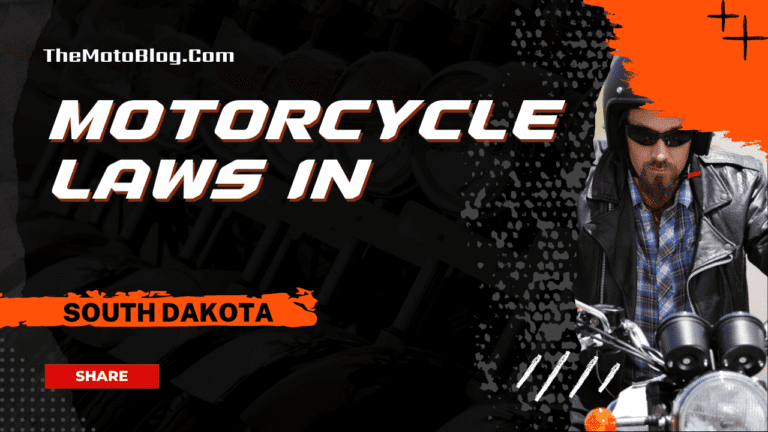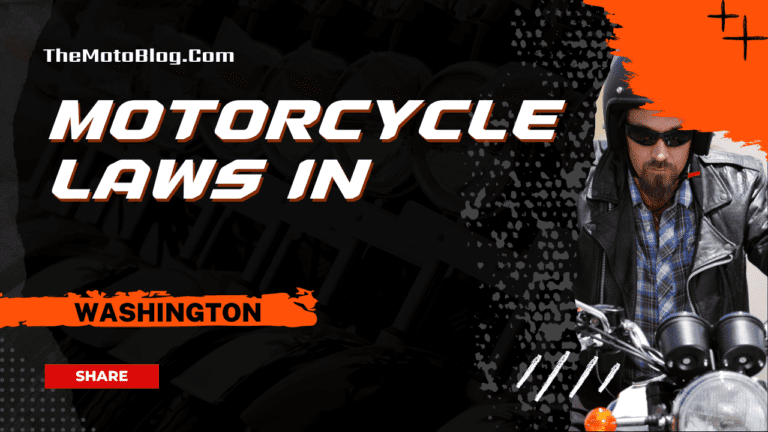Motorcycle Laws in New Mexico: A Comprehensive Guide for Riders
Navigating the open roads of New Mexico on a motorcycle presents a unique sense of freedom. It’s an experience that I’ve grown to love over time, but it’s also one that requires knowledge and understanding of the state’s laws pertinent to motorcycling. After all, safety is paramount when you’re sharing the road with others.
New Mexico has specific motorcycle laws in place to ensure not just my safety, but the well-being of everyone on the road. From helmet requirements to lane splitting regulations, these rules are intended to make our journeys less risky and more enjoyable.
I’ll delve further into these laws in this article, offering insight from my personal experiences while riding across New Mexico’s diverse landscapes. This isn’t simply about adhering to rules – it’s about fostering a safer and more considerate biking community for us all.
Key Takeaways
- Motorcycle laws in New Mexico are designed for road safety, requiring helmets for riders under 18.
- Riders over 18 are encouraged, but not required, to use helmets.
- Eye protection is mandatory for all riders, regardless of age.
- Lane splitting is not legal in New Mexico.
- New Mexico law mandates motorcycles to have all rights and duties applicable to regular motor vehicles.
- Those wishing to ride a motorcycle in the state must obtain an M endorsement on their driver’s license, which involves passing both written and road tests specifically designed for motorcycles.
- If under 18, a state-approved Basic Rider Course (BRC) completion is required.
- Motorcycle insurance is mandatory in New Mexico with minimum coverage requirements set by the law.
- Helmets and eye protection are mandatory for riders under 18, with other safety gear highly recommended.
- Riders violating motorcycle laws in New Mexico can face fines, license suspension, higher insurance premiums, mandatory safety courses, and points added to their driving record.
- The state doesn’t reciprocate helmet laws from other states, making helmets mandatory for riders under 18 regardless of their home state’s laws.
- Riding without insurance could result in heavy fines and suspension of the rider’s license.
- Regularly checking for updates is advised, as laws may change over time.
Motorcycle laws in New Mexico are specifically structured to enhance road safety, requiring helmets for riders under the age of 18, while strongly encouraging their use for all motorcyclists. When looking at the surrounding states, one can observe various rules and regulations. In neighboring Texas, helmet laws are applicable for riders under 21 or without a health insurance plan specifically covering motorcycle accidents. Likewise, Arizona’s motorcycle laws enforce helmets for riders under 18, reflecting a similar policy to New Mexico. Colorado’s motorcycle regulations focus on helmets for riders and passengers under 18 and require eye protection for all. Finally, the motorcycle laws in Utah highlight the necessity of safety courses and helmets for riders under 21. Riders traveling through the Southwest must stay informed about these varying laws to ensure compliance and safe riding experiences across state lines.
Understanding New Mexico’s Motorcycle Laws
New Mexico is a state with its own unique set of motorcycle laws. Let me break them down for you.
Firstly, all riders in the Land of Enchantment must wear a helmet if they’re under 18 years old. This law applies regardless of whether you’re driving or just hitching a ride.
Next up is eye protection. If your bike doesn’t have a windscreen, then goggles or protective glasses are mandatory for all riders—no matter their age. You’ll also need to ensure that any passenger riding with you has appropriate eye protection too.
Then there’s the topic of insurance. Riding without proper insurance cover can lead to hefty fines and even suspension of your riding privileges.
To legally drive a motorcycle in New Mexico requires an endorsement on top of having a standard driver’s license; this means passing both written and skills tests specifically for motorcycles.
Helmet Regulations in New Mexico
Interestingly, New Mexico has partial helmet laws. This means that not all riders are required to wear one. If you’re over 18, it’s your choice whether or not to don that piece of protective gear. However, if you’re under 18, there’s no room for debate – helmets are mandatory.
But before you decide to feel the wind in your hair, consider this: The National Highway Traffic Safety Administration estimates that helmets saved nearly 1,900 lives in 2016 alone. And if everyone had worn them, they believe another 802 lives could’ve been spared.
Now let’s get into specifics about the type of helmet required by law for those under 18. It must meet or exceed standards set by either the American National Standards Institute (ANSI) or the Federal Motor Vehicle Safety Standard (FMVSS).
- Helmets should have an inner liner at least one inch thick
- There should be no cracks or breaks in the shell
- The chin strap needs to be securely fastened
Lane Splitting: Is It Legal?
Unlike California, where lane splitting is permitted, it’s not legal in the Land of Enchantment.
New Mexico law mandates that motorcycles are granted all rights and subject to all duties applicable to regular motor vehicles. This means you’re required to stay within a designated lane, just like any other vehicle on the road.
Here’s a sneak peek into some specifics concerning motorcycle laws in New Mexico:
- Riders must wear helmets if they’re under 18.
- Daytime use of headlights is mandatory for all riders.
- Handlebars can’t be higher than the rider’s shoulder height.
In terms of safety, there are mixed opinions about lane splitting. Some argue it reduces congestion and enhances rider safety by reducing rear-end collisions. Others contend it increases risk due to reduced space for maneuvering and potential blind spots.
Motorcycle Endorsements and Licensing Requirements
To start with, anyone wanting to ride a motorcycle in New Mexico must obtain an M endorsement on their driver’s license. This requires passing both written and road tests specifically designed for motorcycles. If you’re under 18, there’s also an additional requirement – completion of a state-approved Basic Rider Course (BRC).
Here are some key points about the BRC:
- It’s taught by Motorcycle Safety Foundation certified instructors
- The course includes classroom instruction and practical riding experience
- Helmets and motorcycles are provided for use during the course
In addition to these basic requirements, all riders, regardless of age or experience level, should consider taking advanced rider courses. These classes can provide invaluable information on defensive driving tactics specific to motorcycling.
Now let’s take a look at licensing itself.
For those under 18:
| Age | Requirement |
|---|---|
| Under 13 | Not eligible for any type of license |
| 13-15 | May apply for a learner’s permit after completing BRC |
| 16-17 | May apply for provisional license after having learner’s permit for six months |
Once you turn 18, though, things change quite drastically:
- Pass vision test
- Pass written exam
- Complete required training
- Successfully pass road test
The Role of Motorcycle Insurance in New Mexico
I’m here to shed some light on the role that motorcycle insurance plays in New Mexico. In this state, like many others, it’s mandatory for all motorcyclists to have insurance coverage. This isn’t just a bureaucratic rule, but a safety net that can save you from significant financial woes if you’re ever involved in an accident.
Firstly, let’s look at the minimum coverage requirements set by New Mexico law:
| Coverage | Minimum Required |
|---|---|
| Bodily Injury Liability per person | $25,000 |
| Bodily Injury Liability per accident | $50,000 |
| Property Damage Liability | $10,000 |
These figures represent the least amount of coverage you’ll need. However, I’d suggest considering more comprehensive policies if possible. Remember: higher coverage equals greater protection.
Beyond simply meeting legal requirements, having robust insurance can also provide peace of mind. If you’re ever involved in an accident or your motorcycle gets stolen — scenarios no one wants to think about — adequate insurance could be a lifesaver.
Keep these pointers in mind when shopping for motorcycle insurance:
- Shop around: Different companies offer varying rates and coverages.
- Consider higher deductibles: It means paying more out-of-pocket if an accident occurs but reduces your monthly premium.
- Take advantage of discounts: Many insurers provide discounts for safe riders and those who bundle multiple policies together.
Passenger and Age Restrictions for Motorcyclists
Let’s delve right into the passenger and age restrictions for motorcyclists in New Mexico. If you’re planning to ride with a passenger, it’s essential that your motorcycle is designed to carry more than one person. That means it must have a permanent regular seat or an additional seat specifically intended for a passenger.
Now, on to the topic of age restrictions. In New Mexico, any individual under 18 years old is required by law to wear a properly fitted safety helmet when operating or riding as a passenger on a motorcycle.
As far as carrying passengers goes, there are no specific age restrictions set forth by state laws. However, both operators and passengers need to be tall enough to reach the footrests while seated on the motorcycle seat.
Here’s some useful data in simplified format:
| Topic | Requirement |
|---|---|
| Helmet law | Under 18 years old |
| Passenger Seat | Required if carrying passengers |
| Foot Rests | Must be reachable by operator and passenger |
Equipment and Safety Gear Mandates
Firstly, helmets. All riders under 18 years old must wear a helmet when operating or riding on a motorcycle. This includes passengers too. Here’s how this breaks down:
| Age | Helmet Requirement |
|---|---|
| Under 18 | Yes |
| 18 and over | No |
Next, let’s look at eye protection – it’s mandatory for all riders, regardless of age. You can opt for goggles, glasses with safety lenses, or a transparent face shield.
Moving to lighting, your motorcycle should have one headlamp that illuminates objects at least 150 feet ahead. Two auxiliary lamps can be added if desired.
Regarding mufflers, they’re required but cutouts and bypasses are prohibited.
Let’s not forget about turn signals – both front and rear ones are necessary in New Mexico.
Here are some other important mandates:
- Handlebar Height: The handlebars shouldn’t be more than 15 inches above the seat.
- Passenger Seat: If carrying passengers, you need a permanent and regular seat for them.
- Mirrors: One mirror is required; however having two is recommended.
- Footrest: A footrest is required if you’re carrying passengers.
Lastly, New Mexico doesn’t mandate wearing specific clothing while riding motorcycles but given the potential risks involved in motorcycling, it’s smart to invest in durable jackets and pants along with gloves and boots for added protection.
Penalties for Violating Motorcycle Laws
The repercussions vary depending on the offense. For minor infractions like not wearing a helmet (if under 18), the fines are relatively light – typically around $50. Meanwhile, more serious violations such as reckless driving could lead to hefty fines up to $1,000 or even imprisonment.
| Offense | Penalty |
|---|---|
| Not Wearing a Helmet (under 18) | $50 Fine |
| Reckless Driving | Up to $1,000 Fine or Imprisonment |
Now onto repeat offenders – they don’t have it easy either. Repeat offenses often lead to escalated penalties which could include higher fines and longer incarceration periods. Don’t forget about possible license suspension too!
Here are some other potential consequences:
- Increased insurance premiums
- Mandatory safety courses
- Points added to your driving record
Remember that ignorance of the law is no excuse. You’re expected to be aware of all rules and regulations pertaining to motorcycling in New Mexico – from age restrictions right down to equipment requirements.
Also worth noting is how violations can affect any existing legal proceedings like custody battles or immigration status reviews – yep, things can get really complicated! So let this serve as a stark reminder: obey motorcycle laws; it’s better than dealing with unpleasant outcomes later on.
How These Laws Affect Out-of-State Riders
Firstly, New Mexico doesn’t reciprocate helmet laws from other states. Essentially, if you’re under 18, a helmet is mandatory regardless of where you’re from or what your home state dictates. If you’re over 18, it’s still highly recommended for safety – but not required by law.
Next up is the eye protection law. Unlike some states where it only applies if there’s no windshield on the bike, in New Mexico, eye protection is mandatory for all riders and passengers – no exceptions!
New Mexico also has specific rules for motorcycles regarding lane usage. For instance:
- You can’t ride more than two abreast in a single lane.
- Lane splitting (riding between lanes of traffic) isn’t allowed.
- You must use daytime headlights at all times.
Here are these key points summarized:
| Requirements | Under 18 | Over 18 |
|---|---|---|
| Helmets | Mandatory | Recommended |
| Eye Protection | Mandatory | Mandatory |
Now let’s talk about insurance. While most states require motorcycle insurance coverage, New Mexico stands out with its strict enforcement of this rule. Driving without proof of insurance could land you hefty fines and even suspension of your license!
Lastly, one more thing that sets New Mexico apart: its unique ‘Motorcycle Endorsement’ requirement for licenses. Whether you’re just passing through or planning to stay awhile, be prepared to show this endorsement whenever requested.
Wrapping up: Complying with New Mexico’s Motorcycle Laws
So, we’ve made it to the end of our journey through New Mexico’s motorcycle laws. I hope you’re feeling more informed and prepared. Compliance isn’t just about avoiding fines – it’s truly about your safety and that of others on the road. That said, let’s recap some key points:
- Helmet use is required for riders under 18 or those holding a learner’s permit.
- Eye protection is mandatory unless your bike has a windscreen.
- You must always keep at least one hand on the handlebars while riding.
Remember these aren’t all the rules but they’re some of the big ones you should bear in mind as you hit the open roads in New Mexico.
If there was one takeaway I’d want you to remember from this article, it would be that understanding and adhering to state motorcycle laws can make all the difference between an enjoyable ride and a disastrous one. Being well-informed reduces risk and increases your confidence, making every trip not just safer, but also more fun.
And finally, don’t forget to regularly check back for updates as laws may change over time. Until next time, stay safe out there!
Motorcycle Laws in the US By States
If you liked this article, then please subscribe to our YouTube Channel for more Bike Videos. You can also find us on Instagram, Twitter and Facebook.
Disclosure: As an Amazon Associate, I earn from qualifying purchases. Read more about Amazon Affiliate Disclaimer.

Vishwanath Mathpati
I am Vishwanath Mathpati, a full-time Blogger and Motorcyclist from Bidar, Karnataka. I love writing about my Motorcycles Stories and Riding Gears on this blog.
Know More About Me.







